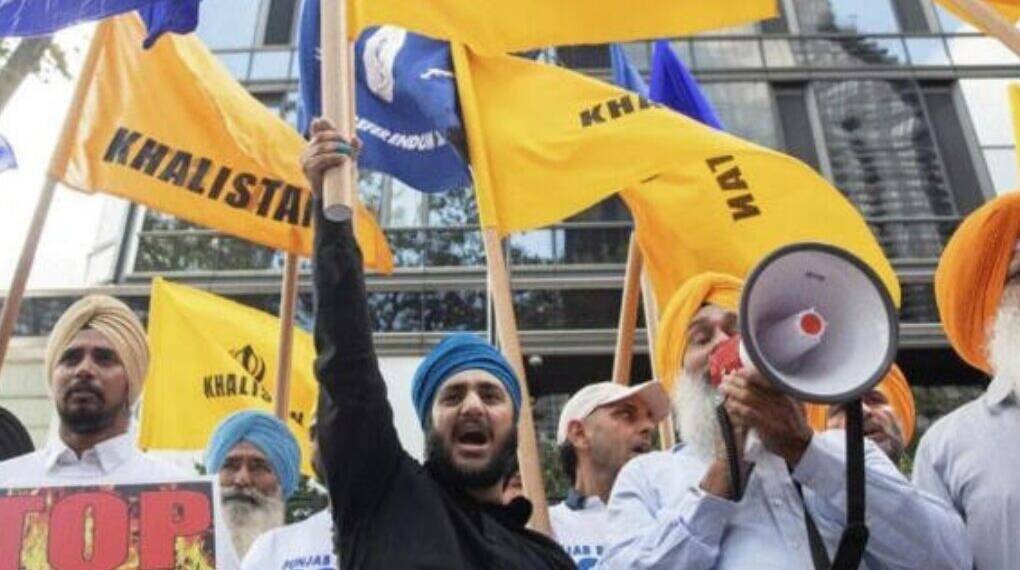For the first time, the Canadian Security Intelligence Service has acknowledged that Khalistani extremist networks remain active in Canada and plans attacks against India.
Canada’s top intelligence agency, the Canadian Security Intelligence Service (CSIS), in its latest annual report, has warned that Khalistani extremist networks remain active in Canada and continue to use the country as a launchpad for promoting, financing, and planning violent acts against India.
The report was released following Indian Prime Minister Narendra Modi’s visit to Canada for the G7 Summit, where he sought to reset ties with Ottawa after two years of strained diplomatic relations between the two countries.
CSIS released its annual report on Wednesday, outlining some key concerns and threats to Canada’s national security.
This comes a day after Prime Minister Narendra Modi and his Canadian counterpart Mark Carney “agreed to restore high commissioners in Delhi and Ottawa — a move that signals a potential shift in their strained relationship.
After two years of tensions, India and Canada have agreed to take calibrated steps to resume diplomatic ties and explore areas of cooperation.
In its annual national security threat assessment, CSIS stated: “Khalistani extremists continue to use Canada as a base for the promotion, fundraising, or planning of violence primarily in India.”
Under the section titled “Canada-Based Khalistani Extremism,” the report further notes: “Canadian-based Khalistani extremists use Canada as a base to support pro-Khalistani extremism as well as attack planning targeting India. As such, the activities of CBKEs constitute a threat to the security of Canada. However, at present, it is assessed that CBKEs do not have the intent to conduct an attack here in Canada.”
The report also highlighted that individuals and organised networks associated with the Khalistan movement continue to operate within Canadian borders.
Additionally, CSIS identified two key Sikh organisations — Babbar Khalsa International (BKI) and the International Sikh Youth Federation — as being associated with terrorism. Both remain listed as terrorist entities under the Criminal Code of Canada.
CSIS investigates activities that fall under the definition of threats to Canada’s national security, as outlined in the CSIS Act. These include espionage and sabotage, foreign interference, terrorism and violent extremism, and subversion.
Under the section on Risk Assessment Decisions for Violent Political Extremism (2009-02), the report referenced the 2003 charges related to the Air India bombing, which was motivated by Sikh nationalism. Members of Babbar Khalsa and the International Sikh Youth Federation were implicated in the bombing of Air India Flight 182, which was en route from Vancouver to India on June 23, 1985. The Boeing 747 was destroyed at an altitude of 9,500 meters, killing all 329 people on board, including 280 Canadian citizens. It remains the deadliest terrorist incident in Canadian history.
The report also emphasized that politically motivated violent extremism (PMVE) encourages the use of violence to establish new political systems, structures, or norms within existing systems. PMVE actors are involved in planning, financing, and facilitating attacks globally to further their political aims.
Since the mid-1980s, the PMVE threat in Canada has primarily manifested through Canada-based Khalistani extremists (CBKEs) seeking to use violent means to create an independent nation-state, Khalistan, largely within the Indian state of Punjab.
While some Canadians support the Khalistan movement through legitimate and peaceful advocacy — which is not considered extremism — a small group continues to promote, fundraise, or plan violence, primarily targeting India.
Though no CBKE-related attacks occurred in Canada in 2024, their ongoing involvement in violent activities continues to pose a national security threat to both Canada and Canadian interests. Notably, both real and perceived Khalistani extremism originating in Canada continues to drive Indian concerns and foreign interference activities within the country.
Relations between the two nations plunged to historic lows in 2023 during G20 summit in New Delhi after Canadian Prime Minister Justin Trudeau accused Indian officials of being involved in the killing of Khalistani separatist Hardeep Singh Nijjar. The Trudeau government alleged that India orchestrated the killing, while India denied the claims and, in turn, accused Canada of failing to protect Indian diplomats from Khalistani threats.The diplomatic fallout led to visa suspensions, mutual expulsions of diplomats, and a freeze in trade negotiations.
This breakthrough came during prime Minister Narendra Modi’s discussions with Canada ‘s newly elected Prime Minister Mark Carney on the side-lines of the G7-outreach session in Kananaskis, where India was a special invitee.
Modi and Carney reaffirmed their commitment to shared democratic values and sovereignty, and agreed to restore normal diplomatic presence, including the early return of High Commissioners to each other’s capitals, as per the PMO statement.
Both sides underscored the need to resume negotiations on the Early Progress Trade Agreement (EPTA) and take it forward with the objective of concluding a broader Comprehensive Economic Partnership Agreement (CEPA), as per a press note issued by the Prime Minister’s Office (PMO).
“The Prime Ministers agreed to take calibrated steps to restore stability to this very important relationship. The first of these steps agreed upon was to restore high commissioners to each other’s capitals at an early date,” Foreign Secretary Vikram Misri announced after the meeting.
Misri also informed that working level mechanisms in a host of areas related to trade, people to people contact, and connectivity” has also been resumed.
Restarting stalled talks on Trade Agreement
The two sides also committed to restarting stalled talks on the Early Progress Trade Agreement (EPTA), aiming ultimately for a Comprehensive Economic Partnership Agreement (CEPA). Visa services, mobility partnerships, and dialogue mechanisms in sectors like clean energy, digital transition, and critical minerals are also back on the table.








